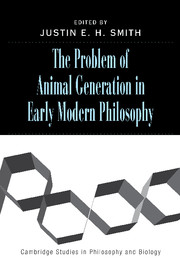Book contents
- Frontmatter
- Contents
- List of Contributors
- Introduction
- I THE DAWNING OF A NEW ERA
- II THE CARTESIAN PROGRAM
- III THE GASSENDIAN ALTERNATIVE
- IV SECOND-WAVE MECHANISM AND THE RETURN OF ANIMAL SOULS, 1650–1700
- V BETWEEN EPIGENESIS AND PREEXISTENCE: THE DEBATE INTENSIFIES, 1700–1770
- VI KANT AND HIS CONTEMPORARIES ON DEVELOPMENT AND THE PROBLEM OF ORGANIZED MATTER
- VII KANT AND THE BEGINNINGS OF EVOLUTION
- 16 Kant and the Speculative Sciences of Origins
- 17 Kant and Evolution
- Bibliography
- Index
17 - Kant and Evolution
Published online by Cambridge University Press: 06 August 2009
- Frontmatter
- Contents
- List of Contributors
- Introduction
- I THE DAWNING OF A NEW ERA
- II THE CARTESIAN PROGRAM
- III THE GASSENDIAN ALTERNATIVE
- IV SECOND-WAVE MECHANISM AND THE RETURN OF ANIMAL SOULS, 1650–1700
- V BETWEEN EPIGENESIS AND PREEXISTENCE: THE DEBATE INTENSIFIES, 1700–1770
- VI KANT AND HIS CONTEMPORARIES ON DEVELOPMENT AND THE PROBLEM OF ORGANIZED MATTER
- VII KANT AND THE BEGINNINGS OF EVOLUTION
- 16 Kant and the Speculative Sciences of Origins
- 17 Kant and Evolution
- Bibliography
- Index
Summary
Where did Immanuel Kant stand on the question of organic evolution? This has been a topic of much debate, and it seems that it is still ongoing. Some think that he was close if not committed to evolution (see chapter 16 of this volume). This would fit with a general dynamic view of nature and harmonizes nicely with Kant's hypothesis about a natural origin of the universe – his formulation of what is known as the “nebular hypothesis.” Others think that he was not in fact an evolutionist but that this was a contingent matter. Kant could have been an evolutionist; it was just that he did not think the facts were favorable to the idea (Richards 2003). And yet others – and I am one – think that Kant was not an evolutionist and that his opposition was deep and theoretical. Given his philosophy of nature, he simply could not have been an evolutionist.
In major part, I think the confusion about Kant's position represents confusion in Kant's own thinking. To say something that a historian of philosophy can say but that a historian of science would never say, Kant simply was not dealing with a full deck and so he could not get things right. He did not know about the mechanism of natural selection, the mechanism that gives an adequate lawbound answer to the issue of organic origins. Hence, Kant was groping with the problems without the tools to give the full answers.
- Type
- Chapter
- Information
- The Problem of Animal Generation in Early Modern Philosophy , pp. 402 - 416Publisher: Cambridge University PressPrint publication year: 2006
- 1
- Cited by



